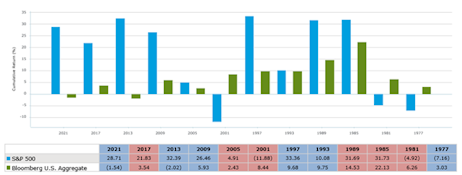
The Impact Presidential Elections Have on Markets
There will continue to be discussions about which presidential party is better for financial markets for the remainder of time, but history shows those discussions are irrelevant. The performance of financial markets, particularly equities, doesn’t hinge on who is sitting in the oval office, but rather on the health of the economy and corporate earnings.

Just under one month stands between now and Election Day, and for some of us, that day cannot arrive soon enough. Campaigning has hit a feverous pitch with ads flooding the airwaves and candidates being critiqued and reported on nonstop.
With the 2024 Presidential Election fast approaching it is time to take a look at the impact past elections have had on financial markets and if there are any trends that might help us make more informed investment decisions during the next four years.
Many are examining which candidate will have the greatest impact on the economy and capital markets. A popular belief is that Republican presidents are better for financial markets. While this belief holds water leading up to a Republican being named to office, it doesn’t hold true during the Republican term as markets, particularly equities, tend to perform well regardless of which party is in the oval office.
In fact, there have only been two presidential administrations, both Republican, when equities produced negative returns during the entire term – President Nixon (between January 1969 – August 1974) and President Bush Jr, (between January 2001 – December 2008) since the Great Depression. Conversely, there have only been two Presidential administrations, both Democratic, that 10-year Treasury total returns were negative during the entire term – President Carter (between January 1977 – December 1980) and President Biden (between January 2021 - present).
Additionally, equities experienced their best performance under the watch of Democratic presidents as the S&P 500 index posted a +15.2% return during President Clinton’s two terms and a solid +13.8% during President Obama’s two terms. Conversely, Republican President Trump oversaw the best performance for the red party with a +13.7% return.
There have been 15 Presidents since the Great Depression and of those 15, the S&P 500 index posted double digit returns during eight of the 15 administrations (Figure 2).
Meanwhile, bonds typically perform better under a Republican administration. As you can see in figure 3, the top four periods of total return performance for 10-year Government bonds happened under Republican administrations. Furthermore, all the primary fixed income sectors performed better on a total return basis under President Trump versus President Biden (Source: Zephyr).
When focusing on the near term, inauguration years tend to be good for stocks, regardless of what party is in control. In fact, the S&P 500 index posted returns of over 20% during the last four inauguration years (2021, 2017, 2013 and 2009) (Figure 4). Furthermore, there have been 12 inaugurations since 1977, in which four of those inauguration years resulted in over 30% returns for the S&P 500 index (2013, 1997, 1989, 1985).
Trying to prove a case that one presidential party is better for markets than the other is even more difficult when looking at equity sectors. The best performing S&P 500 sectors during President Trump’s term were information technology (+31.54%) and consumer discretionary (+20.59%). In what might be a surprise to some, the worst performing sector between January 2017 and December 2020 was the energy sector (-11.94). The story flips for the best performing sectors during Biden’s term (through September 2024) as energy (+30.84%) and information technology (+20.09) sectors outperformed. However, the consumer discretionary sector was the worst performing sector between January 2021 and September 2024 (+6.60%) (Source: Zephyr).
While equity performance has typically been strong during the first year of the Presidential term and generally positive throughout the entire term, equity (VIX) and bond (MOVE) volatility typically spikes immediately following the election. Regardless of what party wins the election, history shows volatility increases during the 30 days immediately following the election. However, equities and bonds tend to experience more volatility following a Republican victory (Figure 5).
While the popular belief is Republican Presidents are better for financial markets, that is not necessarily the case, especially for equities. While the sitting Presidential party may have an impact on what equity sectors perform better than others, the broader equity market tends to perform well regardless of what presidential party is in office. However, history also shows that bond performance tends to be better under Republican administrations.
There will continue to be discussions about which presidential party is better for financial markets for the remainder of time, but history shows those discussions are irrelevant. The performance of financial markets, particularly equities, doesn’t hinge on who is sitting in the oval office, but rather on the health of the economy and corporate earnings. Rather than focusing on who will be President for the next four years, focus on the long term when building investment portfolios.
About the Author
As Zephyr’s Market Strategist, Ryan Nauman provides analysis and research on market trends across asset classes, sectors, and regions to help empower better asset allocation strategy decisions. He is an accomplished investment strategist who has spent the last 22 years in the investment management industry ranging from working with plan sponsors, managing the investments of retail investors, and providing actionable thought leadership to investment professionals.
Nauman is the host of the popular A to Zephyr and Adjusted for Risk podcasts. He is a well-respected investment industry strategist regularly featured on TD Ameritrade Network, Yahoo! Finance, Bloomberg TV, Bloomberg Radio and Chuck Jaffe’s Money Life podcast. His opinions and market expertise have been published in Reuters, CNBC, Bloomberg, MarketWatch.com, Yahoo! Finance, and the Wall Street Journal.





